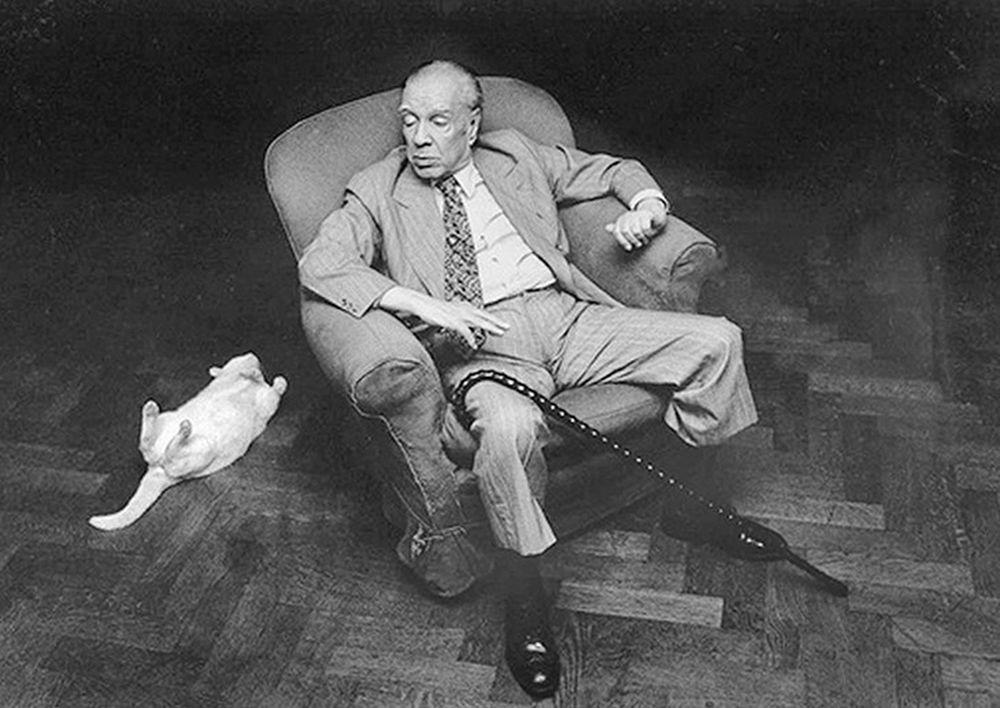Translated from the Spanish by
Evelyn Hooven (July 2019)

Jorge Luis Borges and Kitty (photographer unknown)
The poet, so frequently, of quest and affirming praise becomes
in “Remorse” the voice of assertive, extravagant self-dismissal
and accusation, meriting grandiose punishment. The perspective
goes far beyond any more traditional art-life dichotomy or regret
for paths untrodden. Such vehemence of culpability remains
disquieting even if one truthfully receives it as an aspect of Borges’
willingness to entertain all possibilities, even rejection of his own
(mighty) poetic faculties for not serving, as intended by his forbears,
worldly daring and valor.
Trying, in “End,” to define his physical locale quickly becomes
a total quest to contain the burden of memories and to locate his
own voice. We inevitably recognize familiar Borges terrain in the
entreaty against oblivion.
Remorse
I have committed the worst of sins
that a man can commit. I have not been
happy. Let glaciers of oblivion
encircle and drop me, merciless.
My parents begot me for the game—
daring and lovely—of life itself,
for earth and water, for the air and fire.
I cheated them. I wasn’t happy.
I didn’t carry out their youthful will.
My mind applied itself to the obstinate
symmetries of art, that can interweave nothingness.
Valor was my legacy. I wasn’t valiant.
Always it’s at my side. It never leaves me,
the shade of having been a desolate man.
El Remordimiento
He cometido el peor de los pecados
que un hombre puede cometer. No he sido
feliz. Que los glaciares del olvido
me arrastren y me pierdan, despiadados.
Mis padres engendraron para el juego
arriesgado y hermoso de la vida,
para la tierra, el agua, el aire, el fuego.
Los defraudé. No fui feliz. Cumplida
no fue su joven voluntad. Mi mente
se aplicó a las simétricas porfías
del arte, que entreteje naderías.
Me legaron valor. No fui valiente
No me abandona. Siempre está a mi lado
la sombra de haber sido un desdichado.
End
The ancient boy, a man without history,
an orphan who might have been someone dead
makes use in vain of the deserted homestead.
(It was for two, today it’s for memory.
It is for two.) Under the harsh fate,
nearly lost, the man in pain looks for
the voice that was his voice. The miraculous
would be no more irregular than death.
They weigh him down interminably
the trivial and the sacred he recalls,
and they’re our destiny, these mortal
memories vast as a continent.
Make me, I ask of God, No One or Maybe,
boundaryless, not some oblivion.
El Fin
El hijo viejo, el hombre sin historia,
el huérfano que pudo ser el muerto,
agota en vano el caserón desierto.
(Fue de los dos y es hoy de la memoria.
Es de los dos.) Bajo la dura suerte
busca perdido el hombre doloroso
la voz que fue su voz. Lo milagroso
no sería más raro que la muerte.
Lo acosarón interminablemente
los recuerdos sagrados y triviales
que son nuestro destino, esas mortales
memorias vastas como un continente.
Dios o Tal Vez o Nadie, yo le pido
su inagotable imagen, no el olvido.
«Previous Article Table of Contents Next Article»
____________________________
Evelyn Hooven graduated from Mount Holyoke College and received her M.A. from Yale University, where she also studied at The Yale School of Drama. A member of the Dramatists’ Guild, she has had presentations of her verse dramas at several theatrical venues, including The Maxwell Anderson Playwrights Series in Greenwich, CT (after a state-wide competition) and The Poet’s Theatre in Cambridge, MA (result of a national competition). Her poems and translations from the French have appeared in ART TIMES, Chelsea, The Literary Review, THE SHOp: A Magazine of Poetry (in Ireland), The Tribeca Poetry Review, Vallum (in Montreal), and other journals, and her literary criticism in Oxford University’s Essays in Criticism.
Follow NER on Twitter @NERIconoclast







